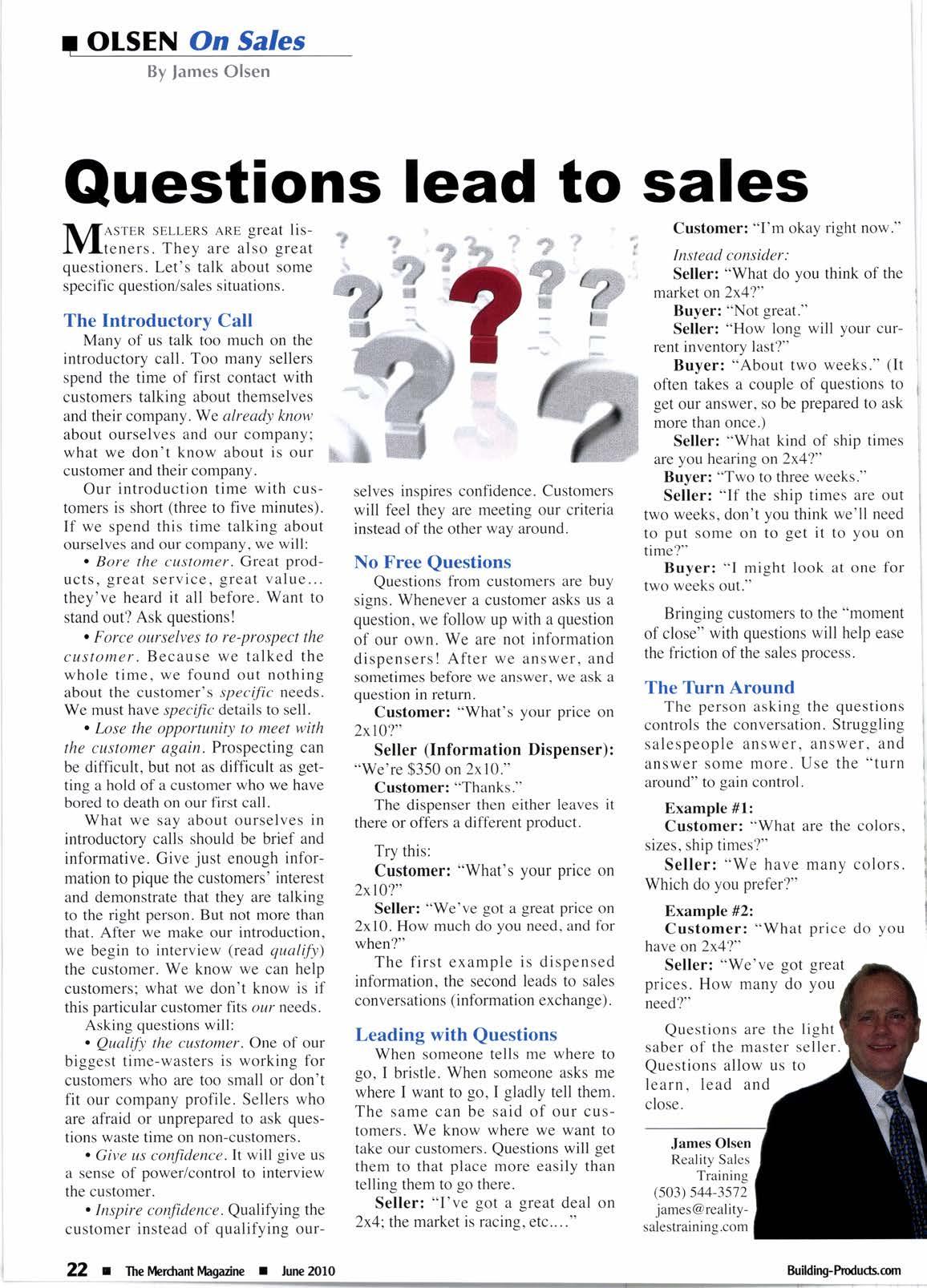
2 minute read
Auestions lead to sales
Ml';:i, :?i'.';'",^J'"i,,lii,il; -,
questioners. Let's talk about some specific question/sales situations.
The Introductory Call
Many of us talk too much on the introductory call. Too many sellers spend the time of first contact with customers talking about themselves and their company. We already know about ourselves and our company; what we don't know about is our gi customer and their company.
Our introduction time with customers is short (three to five minutes). If we spend this time talking about ourselves and our company, we will:
. Bore the customer. Great products, great service, great value... they've heard it all before. Want to stand out? Ask questions!
Force ourselves to re-prospect the customer. Because we talked the whole time, we found out nothing about the customer's specific needs. We must have specijlc details to sell.
, Lose the opportuniry rc meet with the customer again. Prospecting can be difficult, but not as difficult as getting a hold of a customer who we have bored to death on our first call.
What we say about ourselves in introductory calls should be brief and informative. Give just enough information to pique the customers' interest and demonstrate that they are talking to the right person. But not more than that. After we make our introduction, we begin to interview (read qualify) the customer. We know we can help customers; what we don't know is if this particular customer fits orr needs.
Asking questions will:
. Qualify the customer. One of our biggest time-wasters is working for customers who are too small or don't fit our company profile. Sellers who are afraid or unprepared to ask questions waste time on non-customers.
. Give us confidence.It will give us a sense of power/control to interview the customer.
. Inspire confidence. Qualifying the customer instead of qualifying our- selves inspires confidence. Customers will feel they are meeting our criteria instead of the other way around.
No Free Questions
Questions from customers are buy signs. Whenever a customer asks us a question, we follow up with a question of our own. We are not information dispensers! After we answer, and sometimes before we answer. we ask a question in return.
Customer: "What's your price on 2x10?"
Seller (Information Dispenser): "We're $350 on 2x10."
Customer: "Thanks."
The dispenser then either leaves it there or offers a different product.
Try this:
Customer: "What's your price on 2xl0?"
Seller: "We've got a great price on 2x10. How much do you need, and for when?"
The first example is dispensed information, the second leads to sales conversations (information exchange).
Leading with Questions
When someone tells me where to go, I bristle. When someone asks me where I want to go, I gladly tell them. The same can be said of our customers. We know where we want to take our customers. Questions will get them to that place more easily than telling them to go there.
Seller: "I've got a great deal on 2x4;the market is racing, etc...."
Customer: "I'm okav risht now."
Instead consider:
Seller: "What do you think of the market on 2x41"
Buyer: "Not great."
Seller: "How long will your current inventory last?"
Buyer: "About two weeks." (It often takes a couple of questions to get our answer, so be prepared to ask more than once.)
Seller: "What kind of ship times are you hearing on2x4?"
Buyer: "Two to three weeks."
Seller: "lf the ship times are out two weeks, don't you think we'll need to put some on to get it to you on time?"
Buyer: "I might look at one for two weeks out."
Bringing customers to the "moment of close" with questions will help ease the friction of the sales process.
The Ttrrn Around
The person asking the questions controls the conversation. Struggling salespeople answer, answer, and answer some more. Use the "turn around" to gain control.
Example #1:
Customer: "What are the colors, sizes, ship times?"
Seller: "We have many colors. Which do you prefer?"
Example #2:
Customer: "What price do vou have on 2x4?"
Seller: "We've got great prices. How many do you need?"
Questions are the light saber of the master seller. Questions allow us to learn, lead and close.
James Olsen Reality Sales Training (s03) s44-3s72 james@realitysalestraining.com











